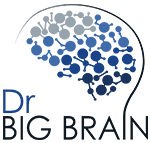Conditions Treated at Dr Big Brain
- ADHD
- Anxiety
- Autism/Spectrum disorders
- Chronic pain
- Dementia
- Depression
- Panic disorder
- Peak performance
- Substance abuse disorders
- Traumatic brain injury (TBI)
- Memory loss
ADHD

A Clinically Proven, Natural Approach
Neurofeedback is a natural approach that is backed by more than 50 years of research and it addresses the underlying factors that contribute to ADHD.
Anxiety

There Is Another Option
Neurofeedback is a solution that is able to monitor your brain function and know if you need more or less key neurotransmitters.
Autism

A Natural Approach
The symptoms of ASD (autism spectrum disorder) usually begin to emerge by age 2 or 3. This may include the inability to perceive sights and sounds adequately, resistance to change in daily routines, poor motor skills, repetitive behaviors or movements, hyper-focus on one thing, and loud outbursts.
Studies indicate that individuals with ASD have excessive connectivity in some areas of the brain and deficient connectivity in others.
Depression

Break Free From Depression and Get Your Life Back
If you have been struggling with depression, you’re not alone. More than 19 million adults suffer from depression. If you are feeling overwhelmed, worn down, fatigued, sad, isolated, foggy-brained, or disconnected, these are classic signs and symptoms that accompany depression. Research at Keck Imaging Labs at the University of Wisconsin shows that depressed people experience a reduction of activity in the left side of the brain. This is the side responsible for engaging in positive moods. When the brainwaves are abnormal, your mood can become abnormal.
Insomnia & Sleeplessness

Sleep Difficulties Have a Variety of Contributors
Many complex factors contribute to sleeplessness and insomnia including stress, anxiety, trauma, and habitual over-thinking resulting in abnormal brain wave function.
Dementia

Improve Your Memory & Decrease Your Risk of Dementia
If you are beginning to notice the signs of brain fog, forgetfulness, declining cognitive function, mixing up your words, asking the same questions repeatedly or taking longer to perform normal tasks, these are all signs and symptoms of memory loss. These are early warning signs of abnormal brainwave function that are often associated with the inability to process information optimally. If left untreated, this can lead to dementia.
Migraines

Stop Suffering From Migraines Naturally With Neurofeedback
Clinical research has shown Neurofeedback to be one of the most effective solutions for the symptoms of migraines. Restore balance and function naturally.
Peak Performance

Working Towards Peak Performance
You work your body — what about your mind?
Whether you are a professional athlete, a top executive, a weekend warrior, a student-athlete, a professional, or a performer, you know that peak performance is essential to your success. But how do you achieve peak performance? The more that is at stake, the greater the need for not only physical training but also brain training.
Post Traumatic Stress Disorder (PTSD) & Trauma

Neurofeedback Designed to Treat Trauma And PTSD
Trauma affects the body and brain in ways that change the underlying biology. Those who suffer from PTSD or trauma often wonder why it’s so difficult to move on from the past. Neurofeedback is a therapy that can help you address the underlying results of trauma or PTSD.
Substance Abuse Disorders

Breaking the Cycle of Addiction with Neurofeedback
Substance abuse disorders arise from addiction in the brain. Drugs cause structural changes in the brain that cause an affected person to keep abusing substances. This leads to a cycle of addiction, outside of the control of the user. Neurofeedback can help treat the underlying addiction.
